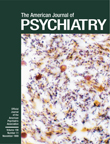Symptoms and Neurocognition as Rate Limiters in Skills Training for Psychotic Patients
Abstract
OBJECTIVE: This study aimed to replicate findings that neurocognitive capacity in schizophrenia is more predictive of acquisition of social skills than are symptoms. METHOD: Thirty-two hospitalized patients with chronic psychotic disorders were randomly assigned to community reintegration skills training or supportive group therapy. Neurocognitive functioning was assessed before treatment, and symptoms and skill levels were measured before and after treatment. RESULTS: The skills training group showed significantly greater skill acquisition. In a regression model, skill acquisition was predicted by group membership and verbal memory capacity and not by symptoms. CONCLUSIONS: With methodological advances, the authors replicated findings regarding the importance of neurocognition in determining treatment outcome in schizophrenia.



